Terry Trusty came to New Canaan late in the summer of 1974, a 15-year-old from Freeman, Va.—a small town in the segregated South dotted with tobacco farms.
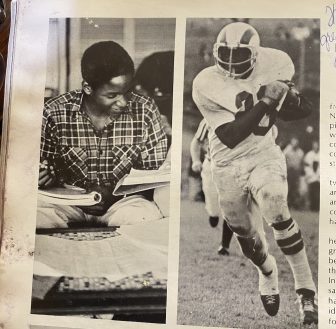
Darrell Washington (L) Terry Trusty (R) in NCHS yearbook.
He’d grown up proud that his father and grandfather purchased the family home using the G.I. Bill.
“That was a wonderful thing,” he told NewCanaanite.com on a recent morning. “They had a 26-acre farm there. We had a nice house. Didn’t have any running water. No bathroom inside, so we had an outhouse.”
He showed promise in school and, in seventh grade, recalled a teacher telling the class that “Harvard is the best.”
“Somehow that struck a chord with me,” Trusty recalled. “It’s almost as if I heard, ‘That’s where you’re meant to go. That’s where you’ve got to go. You don’t know how to do it, but you’ve got to be there.’ ”
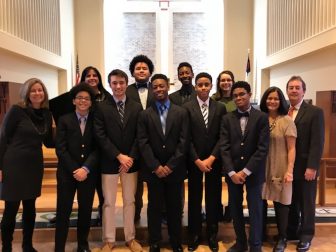
ABC scholars and staff at United Methodist Church in New Canaan, host of the Interfaith Council’s annual celebration of the life of the Rev. Dr. Martin Luther King Jr. Photo courtesy of John Walsh
It was a dream: Everyone else in Trusty’s family had entered the military after finishing school, though his sister had attended Virginia State College, “which was a nice college there in Virginia,” he said.
“But that was the best that we could do in our track,” Trusty added.
He went on to junior high and then Brunswick Senior High School in Lawrenceville, Va., where an English teacher named Magurtha White told Trusty and his friend, Ray Blackwell, about the A Better Chance or “ABC” program.
Conceived after 23 New England headmasters met in 1962 to discuss the relationship of poverty to the lack of quality education, then launched the following year at Dartmouth College in Hanover, N.H., ABC identifies, recruits and develops leaders among underrepresented young people of color. Within a few years, the program came to a local high school in Hanover and, since then, has seen 18,000 alumni graduate from some of the nation’s most rigorous and high-performing schools.
With encouragement and direction from White, Trusty and Blackwell both applied, “not knowing exactly how it would go,” Trusty recalled.
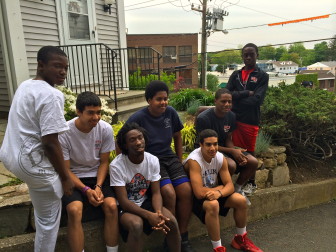
The ABC House of New Canaan’s student residents, for the 2013-14 academic year, L-R: Rajon Mitchell, Chris Roman, Osaze Wilson, Myles Henderson, Brian Maccalla, Chris Andrews and Kwaku Gyasi. Credit: Michael Dinan
“And not long after that, I received a letter that we had been accepted and selected for the New Canaan program,” he continued. “And what an amazing thing that was. And I thought I was making the decision to go but I learned later that my father was contemplating whether or not to let me go. But they decided that that would be a good thing.”
It was.
On Friday, Trusty will join dozens of fellow ABC alumni from throughout the decades, as well as hundreds of supporters of the singular organization, some going back to the New Canaan program’s founding, for a 50th anniversary gala (this silent auction opens Tuesday). From a project taken up and supported by the Congregational Church of New Canaan, ABC has grown into one of the most celebrated nonprofits in town, a mutually beneficial relationship of connecting its scholars to New Canaan High School and the wider community while connecting students and families to the scholars themselves.
‘It Was a Leap of Faith’
Trusty made his way to New Canaan for the first time in late summer 1974—via a bus to Washington, D.C., train to Penn Station, shuttle to Grand Central Terminal and then the local train.
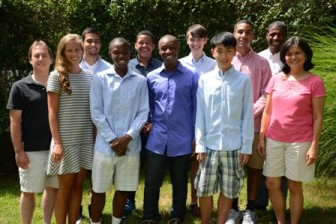
ABC House of New Canaan in the 2015-16 academic year. L-R: Co-resident Director John Walsh (standing in a ditch), resident tutor Ellen Berube, NCHS senior Chris Roman, junior Rajon Mitchell, freshman Ryan Hernandez, sophomore Josiah Jones, sophomore Kai Clancy, freshman George Wang, senior Brian MacCalla, resident tutor Tony Adams and Co-resident Director Laura Walsh. Contributed photo
“It was a wonder, really,” Trusty said of his first impressions in New Canaan. “I took the train—a completely new experience, to do that. Arrived there in New Canaan. As I recall, we were picked up from the train station, somehow or another our travel arrangements had been made. And we arrived in New Canaan, went to the ABC house, which was amazing: Running water, beautiful place. Something I’d never seen before.”
Another new experience: frozen vegetables.
“We lived on a farm, so we had our own vegetables, and I noted that there was no flavor in frozen vegetables, like I had remembered growing up in Virginia,” Trusty recalled with a laugh. “So I ended up having to flavor all of my vegetables with mustard. My other housemates thought that was a little weird, but that gave it some flavor. It was wonderful coming to New Canaan. Beautiful place.” (Trusty also fondly remembered Marietta James—”Mrs. James,” as all called her—the first ABC House cook.)
In some ways, Trusty said, he had no reference point by which to gauge the town.
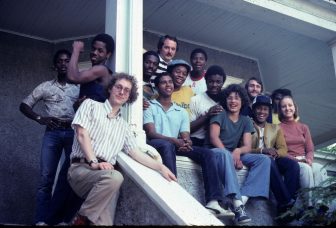
An early photo of ABC House and its first group of scholars. Courtesy of Bruce Schundler
“In Virginia, there was a fair amount of racism and whites were viewed with some skepticism,” he recalled. “I grew up in the Jim Crow South. We had separate sides of the doctor’s office that we would have to go to. Whites would drive by us on their trucks and throw rocks at us. So it was a leap of faith to come to New Canaan and find something different. People that cared about the educational experience, people that treated you with respect. I’m not saying that’s not what people did in Virginia— it just wasn’t in my setting. And so when I came to New Canaan, I found that people were rooting for us, all the guys at ABC, and wanting us to be successful. And that planted something in my heart. It’s a love for New Canaan and for the people there.”
In some ways, the people here were unusual for the time and the region.
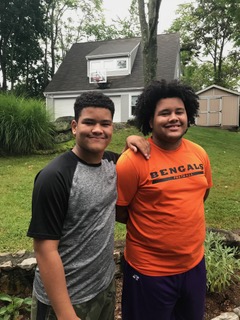
The Hernandez brothers, Richard and Ryan, ABC House of New Canaan scholars. Contributed
“New Canaan starting in the 1940s and 1950s had a bunch more progressive ideas than at least some of its neighboring towns,” said Nancy Geary, executive director of the New Canaan Museum & Historical Society. (Geary organized the “Forces of Change” exhibition at the Historical Society last year, which featured ABC House.)
During that era, town residents Alice and Clarence King bought up properties along the East Avenue corridor and began renting and selling them to Black families, creating a true middle-class Black neighborhood in New Canaan, she said. In 1944, the New Canaan chapter of the NAACP was founded and the group “turned out to be the most successful chapter in Connecticut,” Geary said.
“They were advocating for more Black teachers, for affordable housing,” she said. “So you had all of these groups coming together and then you had the ‘New Canaan Experiment,’ which was a joint program with Norfolk in Virginia, where they sent Black students studying to be teachers up to New Canaan. These teachers lived with New Canaan families, were working in the schools and it was designed to get Black teachers into the schools and to have a more diverse faculty. And from Norfolk’s position, it was to give the teachers an opportunity to be trained and to work in a really good school district. So they had mentors with other teachers. They got to know the community. So it was a win-win on both sides and that went on for many, many years.” (The New Canaan Experiment ran from 1969 to 1977.)
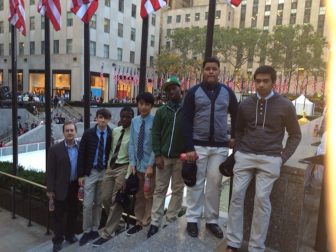
ABC scholars visit Rockefeller Center in NYC. Photo courtesy of John Walsh
It was into this era of New Canaan that Bruce Schundler found himself thrust on arriving in town in 1972.
After earning his master’s degree at Yale Divinity School—he’d already taken a bachelor’s degree in religion and sociology from Princeton—Schundler came to the Congregational Church of New Canaan as an associate minister.
At his first Board of Trustees meeting, Schundler recalled, “I was surprised to hear that the trustees had challenged the ministers with identifying some new mission project that the church could support and get its members involved in.”
“And when I say ‘surprised,’ boards of trustees usually aren’t known for that kind of challenge,” he said. “If anything they usually are known for being a little bit more conservative.”
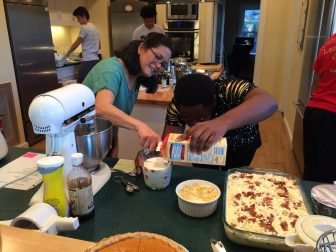
ABC House cooking. Photo courtesy of John Walsh
Schundler helped run the church’s Mission Committee, which studied several possibilities for the project.
“One was to maybe get involved with buying homes that were in bad shape, rehabilitating them and then selling them at cost as low-income housing, or ABC,” he recalled. One of the church members had a cousin who was deeply involved with the Madison, Conn. ABC program.
“Eventually we decided to pursue the Madison [ABC] option,” Schundler said. “There was some pushback and some of the other churches in town didn’t jump on board right away. Some school board members and other people were very supportive. And curiously, a contingent of people who worked at IBM were very supportive.”
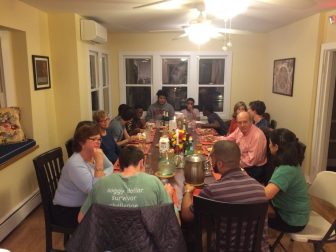
Dinner at ABC House. Photo courtesy of John Walsh
So Schundler began speaking to groups around town about ABC and how the program would run in New Canaan. And during a Congregational Church meeting, he recalled, “one of the older members stood up and kind of rocking on her cane, she said, ‘I know there’s some hesitations in town about this project, but this church has been doing the right thing for over 230 years, why are we hesitating?’ And they voted as a congregation to say, ‘Let’s go ahead.’ ”
And they did, despite some lingering misconceptions among a small portion of the community, he said.
“Pretty quickly people realized that these were not drug addicts, they were just Black kids,” Schundler said. “They weren’t juvenile delinquents, they were just Black kids. That was some of the pushback that we got fairly early, like, ‘Why are you bringing these Black and Hispanic kids who have drug problems?’ and we kept saying, ‘They don’t have drug problems.’ ”
Those voicing such concerns were “a small part” of the town, he said.
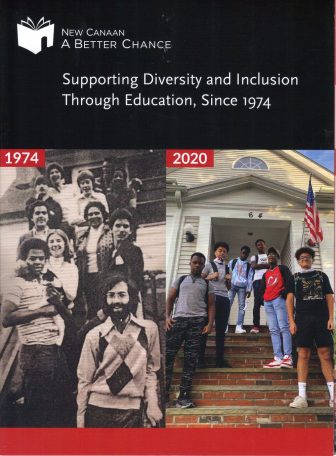
A 2020 ABC brochure. Courtesy of Bruce Schundler
“We didn’t ignore it, but we emphasized the fact that these were just kids who needed an educational opportunity,” Schundler said. “They didn’t have other problems. They weren’t drug addicts. They weren’t juvenile delinquents. And we tried to, I guess you could say, appeal to people’s better instincts, rather than try to make people feel guilty about playing the race card.”
The house itself was a major project. Church officials considered using a church-owned house on God’s Acre, but that structure—where Schundler and his wife, Sara, were living—would need to serve any new minister coming to New Canaan.
So the ABC founders found and purchased the house on Locust Avenue. Its immediate past use had been as a kind of drop-in drug rehabilitation center for youth.
“Most kids weren’t really going there,” he recalled. “And so we bought the house and started renovating it and needless to say, it needed a lot of renovations. And there were a lot of work parties, a lot of volunteer organizations trying to get the place ready because basically the building officials in town decided that it had to be brought up to dormitory standards in any kind of school.”
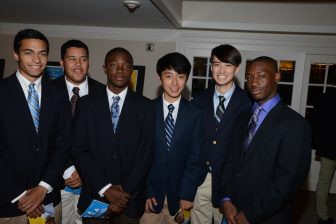
ABC scholars. Photo courtesy of John Walsh
The church “didn’t have a lot of money” for the project, Schundler recalled.
“Our entire first year budget, I think, was $63,000 or something,” he said.
Nearly all the work on the house was done by volunteers, including notable and generous locals such as Lois and Harlan Anderson, who owned the commercial building across the street.
There also were some effective supporters—led by Nancy Walworth, a former selectman—who helped raise funds needed for the renovation and ABC program.
“She called me one day and said, ‘Bruce, you’re having some problems. Let me suggest that two of my friends and I will have three cocktail parties on a particular weekend. You come and show your movies, answer questions and let’s see what happens,’ ” he recalled. “Well, Nancy and her two friends pretty much went down the membership list of the New Canaan Country Club and they had these three cocktail parties and literally, Michael, overnight, things changed. All the other churches got on board. In town, things just changed.”
And just in time: The CO for the house arrived just one week before Trusty came up from Virginia.
‘Everybody’s Looking at Us’
Schundler remembers the first time he heard of Terry Trusty.
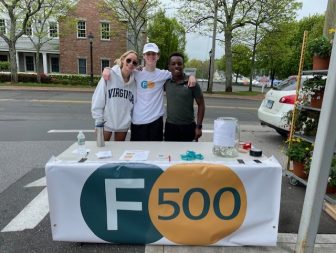
The Tuffs with Dylan Amaswache at a Feeding 500 drive. Photo courtesy of Liz Tuff
“I remember reading his resume, and I remember his teacher saying, ‘You’ve got to take this kid. His brother is driving a truck and his brother is brilliant, but he’s driving a truck. And that’s just wrong,’ ” he recalled. “And so we took Terry and I always tell people that the first time we picked him up at the train station, he had cornrows in his hair, and an earring. Sara and I kind of smiled and said, ‘I hope New Canaan is ready for this,’ because we had never seen cornrows on a real person.”
He added, “These kids were quite courageous to come up.”
Schundler also remembered traveling to the Bronx to pick up another scholar in ABC’s inaugural class: Luis Tavares.
“We drive down to the Bronx and in a not great area,” he recalled. “And we walk in the house and there’s about 15 of Luis’s family members all in a big circle of chairs waiting to interview us and to check us out—who were we, who were these people taking their kid? New Canaan was like the other side of the world. But it was really cute because none of them spoke English. Luis and—I think it was his sister—kept translating just to let them all know that he was going to be safe.”
Schundler said he often tells people that they see just one side of the program, from New Canaan’s perspective.
“But the other side of it is, when you think of the trust or whatever it takes for parents to let their kids go during a prime part of their life, when they’re probably not going to see much of them after that because of college and moving out of home, for the parents to say, OK, this is good,” he said. “And so it was a big leap of faith on their part.”
An ABC scholar’s parents’ leap of faith is something that Laura and John Walsh understand well.
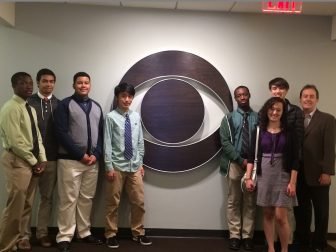
ABC scholars visiting CBS. Photo courtesy of John Walsh
Town residents for about 20 years, the Walshes became the live-in “resident directors” or “RDs” of ABC in New Canaan in 2013, after their youngest went to college, and stayed in the role for five years.
“We heard about the program through friends,” Laura Walsh said. “We thought we could make a difference with the guys and it would really be a meaningful experience for us. So we jumped in knowing it’s going to be tough at times, but we can do it. Organization, keeping track of the kids, making sure that they’re safe and healthy—basically, you take over guardianship for these eight boys. It’s a lot.”
And it can be a lot for the scholars, she added.
“In the beginning you have to realize it’s a huge transition for them to leave their family,” Laura Walsh said. “They’re 13 and they’re so young, they’re like babies as freshmen, but they don’t want to be. They want to have that facade that they can handle it. They’re, ‘I can do this.’ They’re tough guys and sometimes they’re not and you have to know which kid needs a little more coddling and which kid needs to be pushed and told, ‘Get your act together.’ You didn’t want them to fail and be a disappointment to their family, to the host family, to the ABC program, to all the volunteers. There’s so many people involved in ABC and it’s a lot of stress on them.”
And it can be very difficult to look different or live differently from other families in a small town.
The scholars sometimes told the Walshes that “everybody at school and in town treats them well, but almost too well,” John Walsh said.
“They said, ‘We feel like fish in a fishbowl. Everybody’s looking at us. Everybody’s watching us. Everybody wants to know us. Everybody wants to talk to us. Sometimes people want to touch my hair or they ask me about rap music in the Bronx or this or that,’ ” he said. “But they think that they have to represent Black or Hispanic or Asian, whatever it is. They felt like they were just constantly being stared at. And it was just weird.”
Many of the Walshes fondest memories with their ABC scholars was their downtime—John Walsh playing basketball at night (to the point where neighbors had to politely ask the group to stop at 10 p.m. so their own young children could sleep), chatting with house cook Beth Jones, driving a group of the scholars to the Bronx or other places where their’ families lived, so the teens could show each other where they’re from.
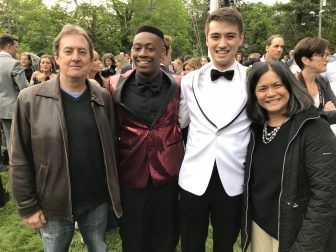
Prom. Photo courtesy of John Walsh
“We did have to show them how to do laundry and things like that,” Laura Walsh said. “And some of them got really into cooking, like on the weekends. And I always had a Thanksgiving thing where we’d invite a lot of the board members and all the guys and myself did the cooking. I taught them some things that they didn’t know and it was fun. We sat around and ate for a couple hours and chatted with people. It was a good time.”
The single biggest factor for making ABC work best for the scholars is support from the teens’ parents back at home, the Walshes said.
“If they really understand the program, what it’s about, and they are supportive, the boy is going to do great,” John Walsh said. “If the parents are not behind you, it doesn’t work.”
To improve communications with parents, John Walsh said he started sending his regular detailed monthly report for the ABC board to parents, as well (something that the current RD has built out, see below).
“We instituted this thing where the two of us and the two tutors—we had this roster of the parents and we would call them once a month, because we found out we were only calling them when something bad was happening,” John Walsh said. “So we said that’s not a good way to go. Let’s make a set once-a-month call to the parents and just talk to them about anything and everything.”
It helped, they said.
The ABC board as currently formed (see names below) has taken solid steps in recent years toward ensuring an even stronger parent relationship with the organization.
Devaun Bovell, an ABC scholar who graduated from NCHS in 2013, graduated from Boston College in 2017 and earned a master’s degree in education from the University of Pennsylvania Graduate School of Education in 2020, joined the ABC board that same year.
He currently works in the business school at Northeastern University in Boston, in its Office of Student Engagement.
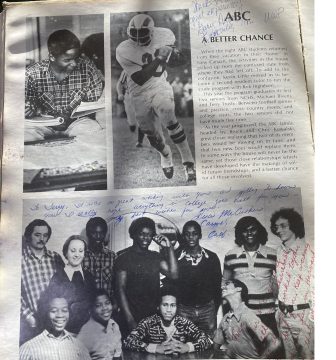
ABC House page in the NCHS “Perannos” yearbook.
A native of Harlem, Bovell was the second ever ABC New Canaan scholar to join the board.
As a rising high school freshman, he’d turned down traditional boarding schools that accepted him in favor of ABC New Canaan in part because “it was just more of that family style feel of the house and the program having a house compared to traditional boarding schools and living in dorms.”
“I felt it just suited what I wanted more,” he said.
As a board member who attended NCHS as an ABC scholar, Bovell brings a unique perspective.
“I will say there were a lot of changes already between my time at the high school and in the program compared to when I started on the board,” he said. “So I think that they were already moving in the right direction.”
Specifically, Bovell said he’s added value as a member of an ABC committee that’s involved in interviewing prospective scholars.
“Being able to speak with families, I think giving them a better perspective of what their child would step into if they were accepted into the program, I think was valuable,” he said. “Really speaking from my experience and giving them a glimpse of where their child could go and what they could achieve if this was the right program for them. I feel like that’s where I felt most impactful.”
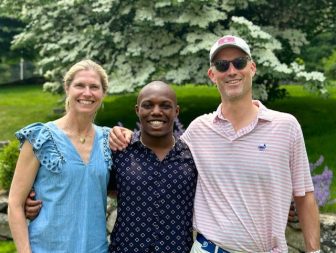
L-R: Liz Tuff, Dylan Amaswache, Alex Tuff. Photo courtesy of Liz Tuff
As in any situation, some ABC scholars came to the program in New Canaan better prepared than others to live in a group setting at such a young age and to squeeze as much as they could out of their NCHS experience, the Walshes said.
Laura Walsh said, “We had kids come back after graduating and say to us, ‘Now I realize. I graduated from high school, I’m in college and I realize I am more equipped to handle college because I’ve already lived away from my parents. I’ve already lived with strangers at first, these seven other guys. And I know how to do my laundry. I know how to fend for myself. And ABC was a good program. And I didn’t realize it when you were telling me to not stay awake at 3 a. m. with your cellphone and get some sleep.’ ”
***
Trusty started life at NCHS as a junior in one of the earliest classes to attend the “new” building on Farm Road.
“The school’s resources were terrific,” he recalled. “Beautiful campus, beautiful fields. The labs, the teachers, their expertise. Ben Gordon, social studies teacher. He always talked about the real versus the ideal. He wanted us to talk a lot about that. And so we did, we always examined that issue. The school was great. Sometimes we would walk to school. Other times we’d take a bus.”
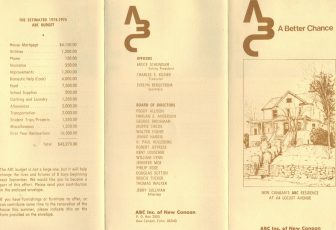
The original ABC New Canaan brochure, page 1. Courtesy of Bruce Schundler
Trusty went out for football and made the JV team, and later the varsity team where he played under legendary head coach Bob Lynch, as well as lacrosse under another legend, coach Howard Benedict.
“Met some great people,” he recalled. “It was a lot of fun. I hadn’t played sports before. We didn’t have the wherewithal to have us play sports, so we worked on the farm. And so having the opportunity to go out for the teams and have that kind of camaraderie was great.”
Trusty did well, earning a commendation on the PSAT and working hard—sometimes with the help of ABC’s valuable tutors—to get good grades. He was like a sponge and— growing up on a rural farm as opposed to a metropolitan area, such as some of his fellow ABC scholars had—he was learning nonstop.
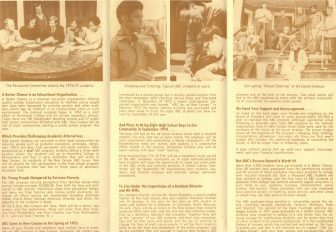
The original ABC New Canaan brochure, page 2. Courtesy of Bruce Schundler
“They all were pretty well accustomed to things that were more metropolitan,” he said. “And I was from a farm, so I didn’t really know about all those things. I didn’t know all the niceties. I’ll have to tell you, I had never met a Jewish person before coming to New Canaan. That was very interesting, too, to see some of those customs and to meet people with that background.”
In the end, by chance, Trusty would become the first person to graduate from the New Canaan ABC program.
Ordinarily, he wouldn’t have been the first to graduate just based on the alphabetical order of surnames (Michael Bivens), “but I had been invited to give some remarks for graduation,” Trusty said.
“And it turns out that they awarded the diplomas to everyone who was on stage first,” he said. “So that honor ended up coming to me almost by accident.”
‘He Has a Family for Life’
For Trusty, the ABC host families that spend significant time with the scholars—serving as a kind of proxy family for the scholars, especially on weekends—are “a great blessing.”
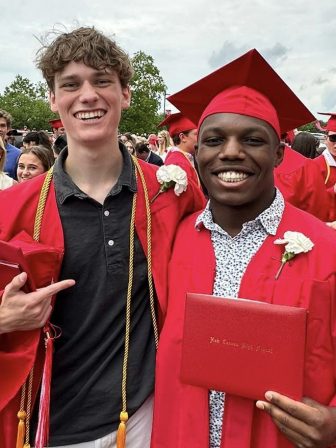
Oliver Tuff (L) and Dylan Amaswache (R). Photo courtesy of Liz Tuff
After arriving in town, he met his own host parents, Sarah and Paul Palmer, and their three sons.
Paul Palmer worked for IBM and he “was very successful” as well as “very competitive,” Trusty recalled.
“That’s one of the things I learned from him,” Trusty said. “He was competitive in basketball, darts, soccer, pool, ping pong. But he always said his first priority was to make sure his family was taken care of. And he would work hard at his dining room table on his business matters just to make sure that everything was taken care of so that he could then spend time with his family and know that they were benefiting from his service and his work. I watched that in Paul. And I wanted to model that in my own life to say, ‘Hey, I want to make sure my family’s taken care of. I want to work hard when I need to work hard so that when I have moments in time with my family, I can spend that time and really enjoy that time with them.’ And so that’s what I got from Paul. Sarah was wonderful, welcomed me into their home, allowed me to be with their children, have fun, and just go relax. It was a great way to have those family connections with them.”
ABC Board President Liz Tuff first came to the organization as a host family mom after learning about it from her friends in New Canaan, the Roscoes, who hosted an ABC scholar.
“The second we heard they were doing this, we just thought, ‘That’s us. We’re doing that,’ ” Tuff recalled.
They did.
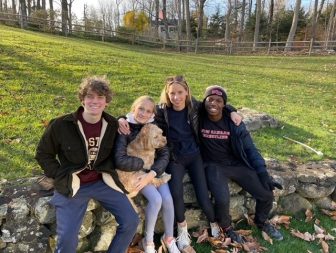
The family. Photo courtesy of Liz Tuff
Residents of the town for 19 years, the Tuffs have three kids and so they waited until one of them was in high school at the time the ABC scholar would be with them—a requirement—to apply. Their ABC scholar, Dylan Amaswache, graduated from New Canaan High School in 2023 alongside Tuff’s own son, Oliver.
Tuff herself has a unique perspective on ABC, as she served on the board for all four years that her family hosted Amaswache.
“We do a very diligent interviewing process for host families,” she said. “We do require that one student in the family that’s hosting is in the high school at the time of your hosting experience. We just believe that’s a great way for the scholar to be immersed in the high school right away, and also easier on the parents for driving purposes and scheduling.”
Once a family expresses an interest, ABC designates a “host family liaison” from its board who then meets several times with the prospective host family.
“And we really ask a lot of detailed questions,” Tuff said, “like ‘How does your family work? How busy are you on the weekends?’ Very specific questions because we want to make sure that this is a great fit. We have these potential host families meet with other board members, other past host families to really understand how it works. It’s a lot of work. It’s very time consuming and you’ve got to be all in.”
ABC starts interviewing prospective scholars each October and the next academic year’s scholars are accepted in March. Host families typically are chosen in May.
Because the ABC host family opportunity is so specific, “it’s not like we have a wait list” of them, Tuff said.
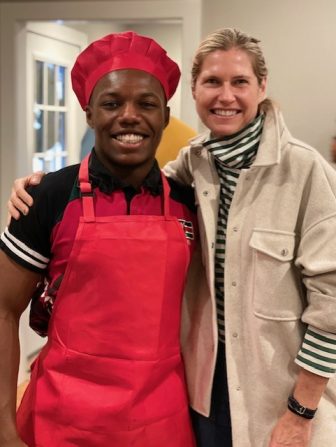
Dylan Amaswache with “Auntie Liz.” Photo courtesy of Liz Tuff
“You need this, you need that—you need a guest room,” she said.
The ABC board does background checks and secures references prior to making its decision.
ABC hears from new people each day and the organization is “always trying to find the younger crowd,” she said.
“A lot of our host families know about ABC as younger families, even if their kids are still in elementary school,” Tuff said. “And that’s really what we’d love to find more of, to keep that going.”
Amaswache, who is from Brockton, Mass., came to the Tuffs “as a very very very quiet only child from a single mom environment,” Tuff said.
“And so when he first arrived— we’re kind of a loud, funny family, a lot of joking, my husband in particular is very loud and outgoing—and so I think the first couple months Dylan was like, ‘Oh my gosh.’ I think he really loved being around a family environment, but I think it was a big adjustment for him. But right off the bat, each of us had our own little relationship with him. It was different from each other’s relationships. My husband took a more fatherly figure… I’m a very open person, so it was a lot of just trying to make him feel really comfortable. I remember one of the first weekends Oliver took him into town and of course, he knew he was going to be attending a program and in a mostly white town, but I think he came back and he was totally culture-shocked. And so we had to sit down and have a conversation with him about the environment and also just, ‘Remember why you’re doing this. You have us as your support system, but also you’re getting an incredible education.’ ”
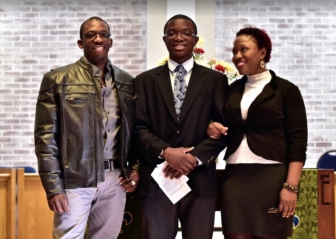
NCHS senior and ABC House of New Canaan student Rajon Mitchell (C) with his stepdad Denzel Fenton and proud mom Elsa Kay Mitchell-Fenton at the Jan. 16, 2017 “Service of Remembrance” honoring Dr. Martin Luther King Jr., held at the United Methodist Church. Credit: Chris Cody
For Tuff, the best part of the host family experience was watching Amaswache grow through his four years in New Canaan.
“It was incredible,” she said. “We definitely had the rebellious 17-year-old one year. But we knew this because we were parents to a 17-year-old already. For us, it was just adding another child that we could love.”
The classmates, Amaswache and Oliver Tuff, didn’t bond much in the beginning because they’re very different and the latter was highly focused on his academics, though they became “very close” over time, Tuff said.
“And I think that was a great experience for both of them,” she said.
“Oliver talks about his experience a lot more now that he sees it in hindsight, in retrospect,” Tuff said. “I think he mentions it to friends all the time, new friends that he’s met, that we had this experience and how incredible it was for our family. And then Dylan and I have a very special relationship. There’s a lot of things as a teenager that you go through.”
Amaswache calls Tuff “Auntie Liz,” she said.
Tuff said she’s also close to Amaswache’s mom, who is from Kenya.
The pair spoke once per week through all four years that her son lived with the Tuffs, she said.
“There were a lot of things that I wanted to run by her because I’m not his mom,” she said. “I’m with him once a week at least and most of the time I would see him twice a week because he needed to go get, you know, wrestling shoes or something.”
Host families have their ABC scholar with them one full weekend per month, Friday to Monday morning, and on the other three weekends the ABC scholar is there overnight from Sunday morning to Monday morning, “so you are seeing them every weekend,” Tuff said.
The scholars go home to their family all school holidays, including three day weekends, and they’re provided transportation, whether that’s a bus, train or even a plane.
“We rarely have anybody flying, but we do have a student now whose mom has moved to North Carolina, so he flies home on long weekends and holidays,” she said.
It’s one way that New Canaan’s program is unique even within the wider world of ABC, and it’s due overwhelmingly to the generosity of New Canaan residents, Tuff said.
“The community is really everything to us,” she said. “We don’t receive any financial benefits or even much support from ABC national. We really do exist a little bit on our own, except we do have a charter with them [national] that we have to sign every year. Besides that, this is so community-based. And the great thing is, because of such strong community response and support, we pay for everything for the scholars. Everything. And that’s very unique for a program like ours.”
New Canaan is one of 20 “community school programs” or “CSPs” nationwide, mostly on the East Coast, “and a lot of them don’t have such a strong host family model, in terms of time spent with host family,” Tuff said.
“A lot of the CSPs have their program set up where the scholars only come once a month to their host family’s house and not everything is paid for, but we really strive very hard to make sure that every single little thing from a boutonniere to the prom to new cleats— everything’s paid for,” she said.
Tuff noted that each relationship between a host family and an ABC scholar’s biological family is different.
Fortunately for ABC New Canaan, the RD of the program, Khanisha Denise Moore, “is constantly in touch with the biological families.”
“She speaks Spanish and also is on constant texting,” Tuff said. “She sends a newsletter every couple of weeks to the biological families, updating them on what each scholar is doing, sports-wise or academically or socially or in the community. And so she’s kind of like our middleman if there isn’t a strong relationship between host family and biological family.”
Referring to ABC New Canaan’s dynamic executive director, Jamie Boris, Tuff added, “And of course, Jamie’s in touch, too, with families.”
With respect to the staff and board, Tuff said, “There’s a lot of great communication. There’s a lot of growth. Everything is kind of working… We really made an effort to give each board member a very specific job and hold them accountable for what that little specific job is. We have a great working board.”
In addition to Boris, Moore and the board—Vice President Dina Connelly, Treasurer Sarah Mattern, Secretary Lisa Hill and members Devaun Bovell, David Cox, William Choi, Megan Dowd, Jill Gordon, Ellen Fitzpatrick, Arthur Hall, Peter Herbert, Alicia C. Meyer, Megan Morales, Alan Rwambuya, Michele Salmini, Thomas Sanseverino, Anne Schimmeck, Nancy Shullman and Julia Stewart—staff members include Resident Program Advisor Kendrick Constant, Resident Tutor Matthew Dorissant and House Cook Beth Jones.
Asked about how her relationship with Amaswache evolved over four years, Tuff said, “It evolved, I think, like any kind of teenage relationship evolves with your own kids.”
“There were times where I really felt like I need to make some decisions for him, but I wanted to make sure I involved Joyce, his mom, so that’s why we talked so often,” she said. “But teenagers, they’re trying to find their way and Dylan was totally trying to find his way with this extra sort of experience of being in a town like ours. He worked hard.”
Amaswache, who is now a freshman at Babson College, was an independent person at NCHS, though “what I thought was the coolest was that he really explored so many different avenues, meeting different people,” Tuff said.
“He never really had one single solid group of friends, but he was friends with a lot of people,” she said. “On the weekends he was on the wrestling team. He was really into working out. He was definitely trying to figure out religion or some kind of spiritual life for himself. He tried YG, but then COVID hit and that sort of stopped for a little bit. He was just very exploratory in terms of trying to find his way. And I just loved watching that.”
To this day, the pair talk once every two weeks, Tuff said.
“He’s coming down to the gala,” she said. “He’s staying with us. He’s staying with us for a little bit of Thanksgiving. He came down after Christmas break and stayed with us. He knows he has a family for life.”
Tickets to the gala itself are sold out, though the silent auction has just gone live.
“This is a really exciting time,” Tuff said. “We are so thankful for the community. Without them, this program would not be successful and it’s just goosebumps when you think about all the people that are coming to the gala. We’re just so excited. So I really want to thank the community. We have some wonderful sponsors in our community. Walter Stewart’s has been just incredible to us. Any time we call them for anything, they say ‘Yes,’ immediately. Manfredi Jewels is a wonderful sponsor of ours. Moffly Media is our media sponsor for the gala and we hope to continue that relationship.”
‘A Better Chance For Me’
Asked about his connection to ABC today, Trusty said, “It’s one of real gratitude.”
After NCHS, he got into Harvard, where he studied psychology and lettered in football and lacrosse.
And he solved a longstanding mystery of why the prestigious college in Cambridge, Mass. had so drawn him as a middle-schooler.
“I later learned that my drive for Harvard was so that I could meet and marry my wife Ellen,” he said. “This year, we will celebrate our 44th wedding anniversary. Without ABC it would not have been possible.”
They have seven children, six daughters and one son: Lauren, Jennifer, Olivia, Angela, Elizabeth, Caroline, and Terry Jr.
The Trusty children were educated at the Bryn Mawr and Gilman Schools in Baltimore, then attended some of the nation’s top universities: Columbia, Dartmouth (2), University of North Carolina Chapel Hill (2), Harvard and the University of Utah. Four of the Trusty children have earned graduate degrees from Johns Hopkins, Georgetown, Northwestern and Harvard Law School.
Professionally, Trusty began his career with IBM as a systems engineer and marketing representative. After 10 years, he joined American Integrated Manufacturing as vice president of sales.
With that consulting and software development experience, he launched technology companies focused on manufacturing and distribution systems, eventually founding Tellen Foods, which provides food service distribution throughout Maryland.
Eight years after leaving ABC New Canaan, Trusty and his wife joined the Church of Jesus Christ of Latter-Day Saints, and over the last four decades, he has served as minister, auditor, teacher and bishop in congregations in Maryland and Pennsylvania.
Today, the Trustys are serving on a three-year assignment as mission leaders in the Florida Tallahassee Mission.
“We’re going to be at the gala,” he said. “We’ve made some donations over the course of time to the program and we talk it up whenever we have an opportunity to say how wonderful it is that there’s an organization started up at Dartmouth that reaches out and transplants people into better circumstances.”
He calls ABC New Canaan “a beautiful experience.”
“My daughter recently said, when I was talking about it, she said, ‘Man, New Canaan really changed our lives.’ And I responded, ‘New Canaan is our lives. Without what happened there, there wouldn’t be any you.’ It just would be totally different.”
At times, Trusty said, he feels like Private Ryan from the great Steven Spielberg film, returning to the American Cemetery of Colleville-sur-Mer, France as an older gentleman, awash with painful and poignant memories from World War II.
“He goes to the cemetery and he’s asking the question, ‘Was it worth it? Did I do what I needed to do to make the sacrifice worthwhile?’ And so I’ve been asking myself that of the great blessing that I received from ABC: Have I made the most of it? And sure, I could do more, but there’s been a lot that I’ve gotten from that. And I feel very satisfied with what I’ve accomplished so far and what I yet want to accomplish. And I trace a lot of that to the roots of ABC, A Better Chance, which really was a better chance for me.”
ABC works, not only because of its Board and staff but because of support from the whole Town.
Thank you for the wonderful article. ABC is amazing! Can’t wait to see Terry and Rob Ingraham (tutor teacher being honored) at the gala!
An extraordinary article, Michael. Thank you.
Many, many thanks for this wonderful report on ABC, one of New Canaan’s proudest outreach programs. What a joy it will be to see so many from the past and present at the forthcoming Gala. You have done it again, Mike!
Thanks for this inspiring & in-depth look at ABC. It’s an extraordinary program that attracts truly wonderful people. Whether it’s the scholars themselves, host families, the board or the executive team, everyone associated with ABC is exceptional.
100%
Fantastic article Mike! We are so blessed to have ABC House in town. I really enjoyed reading about the history of how this came to be in New Canaan.
Thank you! You captured the spirit of ABC and illuminated historic details like the support by IBM folks and The Congregational church that I never knew! Your article is educational and the 50th Anniversary event last night was a sensational culmination of years of ABC-NewCanaan community effort. When people think or talk about today as being “the worst of times”, we can point to your article and the decades of relational work by our New Canaan community to say…….there is good happening everywhere. Just look around. #feelingproud #newcanaanabc #newcanaan #abetterchance
Hi Pollly. Thank you. I’m glad you mentioned IBM, because it’s a very interesting connection. I had to cut some of my interview with Bruce Schundler due to the length of the article, but he did speak longer on IBM. He mentioned that the ABC Board’s first treasurer was a man called Sam (I had written down the surname as ‘Kilner’ but I’m sure that’s wrong, as I was just spelling phonetically from the interview recording). Anyway, Bruce did tell me this (which didn’t make the story): “IBM, like many corporations, was very actively trying to get some diversity and they were having some troubles trying to find really qualified candidates to employ, and ABC fed into the long-range plans of exactly why you have to develop people fairly early.” Also it’s interesting that Terry Trusty launched his very successful professional career with IBM. Locals also will know that the IBM founder, Thomas Watson, developed the estate known today ‘Irwin House’ and ‘Irwin Park’ in New Canaan (the Gores Pavilion went up a few years after his death).
Sam Kilner is correct Mike. He was involved with ABC from the beginning. His wife, Barbara, was a long-time realtor in New Canaan, and before that, an unforgettable monitor in the West School cafeteria. I’m a good friend of their son, Charlie.
Thank you for this info, I appreciate it.